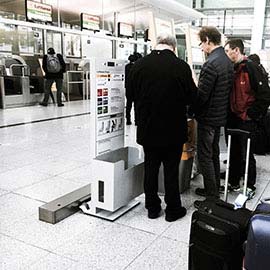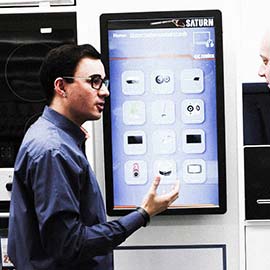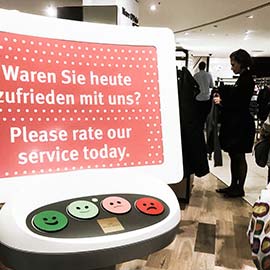Good service starts
with respecting the customer
“Service” in English is a rather obvious and unmistakable term. In German, however, it apparently seems a little trickier. Service, with emphasis on the first syllable is representative for all kinds of services to customers. Whereas the word service with emphasis on the second syllable is a collective term for a complete set of crockery or tableware. The latter is certainly also important in our everyday life, but definitely less complex in its definition. If we interpret the term ‘service’ in its entrepreneurial context, we distinguish three categories of service in general, even though they cannot always be strictly separated from one another:
Service at the core of a service company as it is to be understood in form of rendering one or more client services against payment.
Service as additional customer service before or after the sale of a product or a client service, in which case it is to be understood as a voluntary offer, for instance in form of a customer support hotline which the company usually offers ist clients for free.
Service as package deal as part of the sales process in order to create the most positive customer experience possible. This could be additional perks like for instance a particularly personalised and individual client service, the free offer of product samples or the likes.
However, really excellent service, in whatever form it may be provided, requires a certain amount of personal touch, something that can only work on an equal footing. The therefore necessary emancipation of the respective service providers hasn’t quite been achieved yet in this part of the world. Quite often it still continues to be taken for granted that: „The one who pays the piper calls the tune.” and everyone else is expected to serve without fuss or quibble. This kind of scenario undoubtedly lacks the necessary and justifiably expected respect. Respect as basis for an encounter at the right level, something we call „equal footing“. „We are ladies and gentlemen serving ladies and gentlemen.“ is Ritz-Carlton’s philosophy and service concept which the staff of the hotel chain put into practice every single day, thereby delivering a uniquely pleasant and exquisite service experience for their guests – with utmost and respectful effort, yet always and consistently on a par with their clients. Something many service providers know only too well and unfortunately have to experience on a near- daily basis is the sad reality that customers are more frequently turning abusive, offensive and even aggressive. Service providers are definitely facing enormous challenges nowadays. On one hand they are supposed to be client oriented and ensure top quality service, yet on the other hand their genuine efforts are often challenged if not thwarted by the more and more unacceptable customer behaviour. It is for certain that not all customers are “Kings” or always right, yet they are and will always remain our customers. And irrespective of the fact whether they are right or wrong it is our duty to treat them with dignity and respect. That’s the „simple „basis of decent service. The objective is pretty straightforward, customer service must be designed with outstanding excellence in mind. Only then will a corporate business clearly set itself apart from competitors in such a way that the enterprise can neither be mistaken nor exchanged for another. This, in turn, obviously requires employees who are not only competent and qualified in their field of duty, but who are also well prepared to deal with customers in any day-to-day situation in a respectful and professionally competent manner.
Service can never be limited to one or the other activity for the benefit of the customer;
it must instead be a well-balanced blend of various factors
complementing each other in order to achieve a harmonious overall experience.
- Availability: how and with who can I get in touch if I have any questions or queries with regard to products or services outside business hours, or are
there any possibilities for self-service?
- Speed or rather reaction time: how long will it take until I receive a reply to my email, or how long will I be on hold if I call the hotline, or someone
will call back as promised, or a sales assistant will eventually attend to me or a waiter notices me?
- Fairness: will I be treated equally fairly just like the customer before me, even though I only buy something small? Why is the couple that took seats in
the restaurant after me being attended to first? Even waiting periods that are perceived unfair seem to stretch and appear longer than those that are
considered fair.
- Friendliness: good service is always personal and happens on an equal footing - empathy, attentiveness, a smile, really being there for the customer in the
here and now, genuinely engaging with the client, paying attention to and respecting the client as a human being and tending to the individual needs of the
customer.
- Competence: apart from professional know-how this refers to experience and an individual analysis of what the customer needs as well as clear and
unmistakable communication.
- Transparency: not knowing what’s going on, why it is taking so long and how long it will still take, is truly an unpleasant feeling surely everyone knows or
has experienced at some point, whether at the service counter of a public authority or at the departure gate at the airport. Yet seeing the work involved or at
least being informed of what it takes to receive a particular service can indeed increase customer satisfaction.
- Reliability: personally uttered agreements must be met and service promises must be kept to avoid damage to the credibility and reputation of a business. In
the event of unforeseen circumstances that make compliance difficult or even impossible, such circumstances must immediately, transparently and honestly be
communicated to the customer.
- Generosity and goodwill: small gestures often go a long way. The emotional value of a service rendered with regard to the customer experience is often much
higher than the monetary value for the business. For this reason it may definitely be viable and valuable for a business, not to charge for every small service
rendered.
- The positive surprise: a little more than expected, those small personal gestures that go straight to your customer’s heart, going the extra mile – all this demonstrates to your customers that you value a loyal and long-term customer relationship.
Good customer service definitely has to meet a variety of needs so that ultimately it is perceived and appreciated as really excellent or even outstandingly unique. A corporate enterprise therefore also needs the ability to really understand the people’s needs in all aspects, regardless of whether they are customers, visitors, simply interested clients, guests, and patients etc. so as to be able to take a concrete look at everything in detail and meet the expectations both in direct customer dealings as well as in the provision of the necessary framework required to meet the customers’ needs to their satisfaction. This naturally calls for well-trained, competent and professional staff members that are able to keep the company’s promises to the customers – on a daily basis, always adapted to the current situation and on a par with the customers in direct dealings.
As always in life this is only possible on the basis of mutual respect. Only then will good service really be the distinct corporate feature setting you apart from the rest. Especially in an increasingly digitalized world will this criterion be the decisive key factor for sustainable corporate success. To obtain information, to seek advice and look for consultancy and to eventually buy – all this can after all be done anywhere, on- & offline.



























